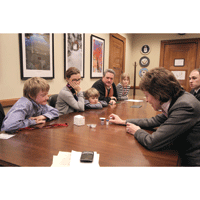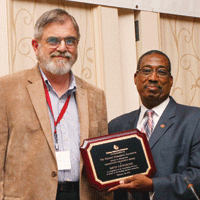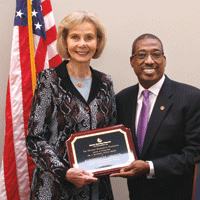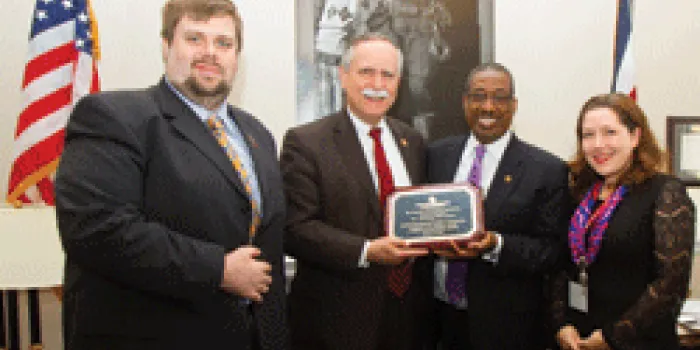To be a successful advocate, you need key tools at your disposal, such as a way to voice your opinion clearly, as well as arguments and counter-arguments. And, most important, you need access to people who can help you implement the changes you’re asking for.
Washington Days, the National Hemophilia Foundation’s (NHF’s) annual advocacy event, gives its attendees these very tools. This year’s meeting, which took place February 26–28 in Washington, DC, offered advocacy training and a full day of Capitol Hill visits, followed by a half-day workshop on state issues.
More than 300 members of the bleeding disorders community from 43 states gathered that Wednesday night for two training sessions: one for first-time attendees about what to expect and how to prepare for a meeting with legislators and another for all attendees, which offered in-depth coverage of the issues people would discuss at the following day’s meetings on the Hill.
The issues community advocates asked representatives to support were the Patients’ Access to Treatments Act of 2013 (H.R. 460). They also asked legislators to continue supporting federally funded hemophilia programs through the Centers for Disease Control and Prevention (CDC) and the Health Resources and Services Administration (HRSA) Maternal and Child Health Bureau.

William Addison explains to Sen.
Susan Collins (R-ME) how he
treats his bleeding disorder as
Jill Packard and Cabe, David
and Grace Addison observe.
Advocates stressed the importance of hemophilia treatment centers (HTCs) in the lives of people with bleeding disorders. Although the money that federal hemophilia programs receive is a tiny part of the overall budgets of the CDC and HRSA, these agencies’ budgets are cut nearly every year.
Nikole Scappe, from Coraopolis, Pennsylvania, told legislators firsthand what her HTC means to her. As an athletic child, she was treated for recurrent hairline fractures in her bones. “I think I had about 16 casts before I turned 13,” she says. “They assumed they were fractures because of the swelling.” After her mother sought an explanation for her own constant bruising, both she and Nikole were diagnosed with severe type I von Willebrand disease.
Being diagnosed and treated at her HTC made all the difference in Scappe’s life. She shared with her representatives the story of her hematologist looking at her old X-rays and telling her that none of them indicated fractures. Instead, the swelling was a result of bleeding. Advocacy training and being able to listen to “veterans” in her group made Scappe more confident as a first-time attendee.

NHF surprised David Cavenaugh
with the Community Champion
Award during training on
Wednesday, in recognition
of his years of advocacy for
the bleeding disorders community.
The Patients’ Access to Treatments Act of 2013, introduced by Reps. David McKinley (R-WV) and Lois Capps (D-CA), would bar insurance companies from designating specific medications as tier IV drugs. Most commercial health insurance companies separate drugs into tiers: tier I for generics, tier II for name brands and tier III for name-brand drugs not included in their formularies. Some insurers have created a tier IV for costly drugs, including biologics such as clotting factor. They require patients to pay co-insurance—a percentage of the medication’s cost—rather than a flat co-pay. These co-insurance payments can range from 25% to 33% of the total cost of the drug, putting payment beyond the reach of most people.
Advocates at Washington Days asked their representatives to co-sign H.R. 460. When meeting with a senator, they asked him or her to consider introducing a companion bill in the Senate. After the NHF Hill day, five more representatives signed on to the bill, bringing the total to 94.

Rep. Lois Capps (D-CA) spoke
to the advocates Thursday,
emphasizing the importance of
telling their personal stories. For
her efforts on H.R. 460, she
received the Dr. L. Michael Kuhn
Award from Val D. Bias, NHF CEO.
“We want to make sure our people are as prepared as possible when they meet with their legislators,” says Michelle Rice, NHF’s director of public policy. Many of the issues the bleeding disorders community has advocated for in the past have been realized, including the passage of the Ricky Ray Act and the elimination of lifetime caps. With proper tools, the bleeding disorders community is proving to be a group of powerful advocates.

